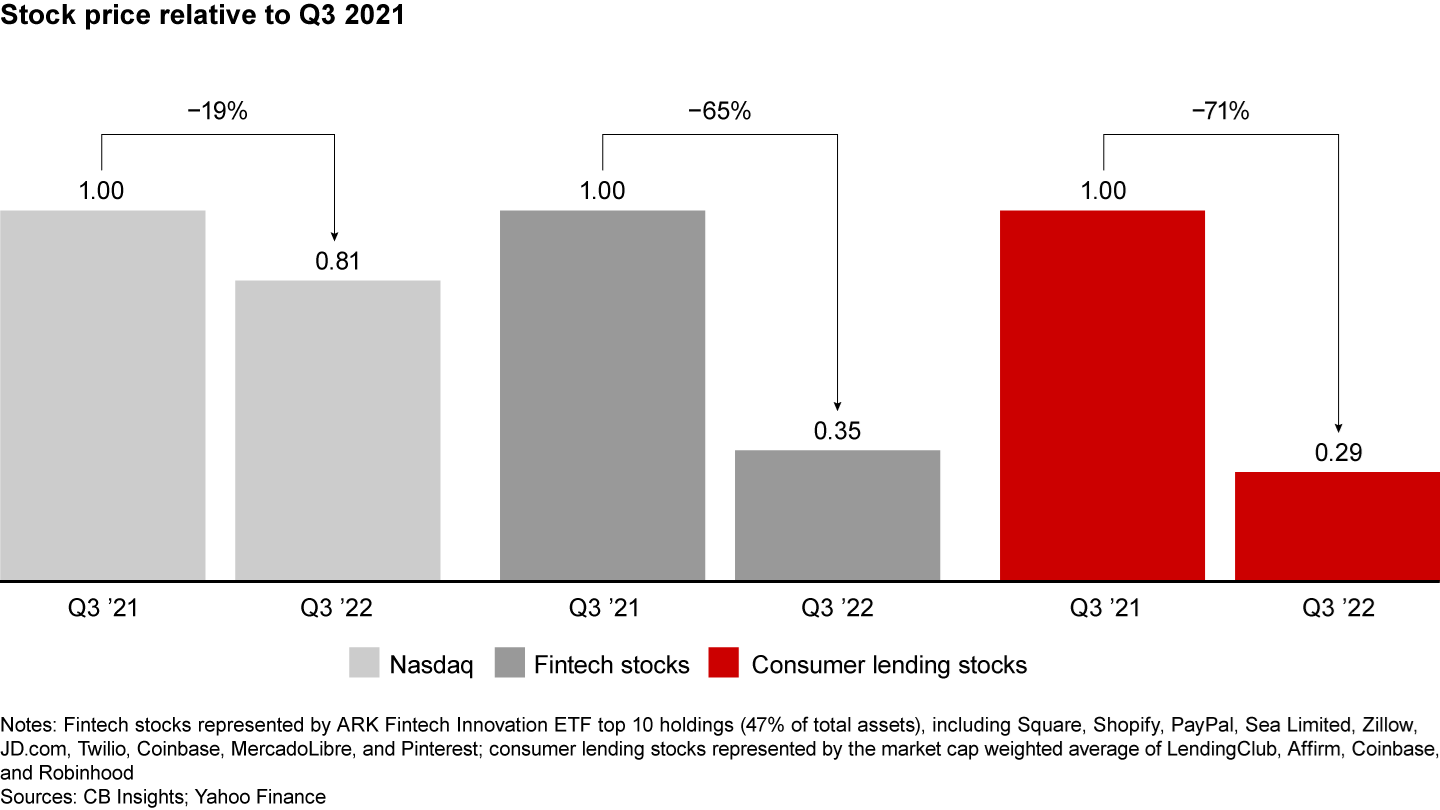Article

Fintech fundraising had a bumper year in 2021, with about 5,000 deals raising roughly $131.5 billion. Revenue multiples reached historic highs, with valuations as much as 25 times revenues by some analysts’ estimate. Access to record funding led a number of fintechs to focus almost exclusively on growth, fueling an accelerated pace of hiring and customer acquisition.
Come 2022, the world looks quite different. Interest rate hikes, inflation, a looming recession, and geopolitical tensions combined to shake up public and private markets. These pressures caused valuations to crash across the entire technology sector.
Fintechs have suffered with sharply reduced valuations and staff layoffs. In private markets, funding dropped by 33% between Q1 and Q2 of 2022, and in public markets, fintech companies fared worse than the broader tech sector. Fintech stocks declined 65% in Q3 2022 vs. the prior year, compared to 19% for the Nasdaq (see Figure 1). And a specific group of fintechs has been especially hard hit: consumer-focused businesses, especially those focused on lending, such as “buy now, pay later” firms.
Declines in technology stock valuations have been most significant for B2C Fintech companies


Interest rate hikes, shifts in public market sentiment, slower digital adoption after the pandemic-induced spending spree, and lower consumer confidence all contributed to the declines.
The interest rate effect
Interest rate hikes served as one trigger to reverse the earlier market exuberance, with the tech sector hit particularly hard. Tech companies, which tend to derive most of their valuation from future cash flows, have seen the present value of future earnings immediately shrink with the rise in discount rates.
Higher rates also mean higher returns for fixed-income assets, pushing some investors to reallocate their funds to some of these safer assets and away from risky asset classes.
Rising rates also affect lending companies and other fintechs in unique ways. These business models rely heavily on cheap access to funding and on the promise to customers of attractive pricing. Stuck between rising costs of funds and elastic demand, the firms now face the prospects of thinning margins or losing customers. In addition, they face a higher risk of defaults, which makes the economics look even less attractive.
Investor and consumer sentiment
As investor sentiment continued to sour, contagion started propagating in private markets. Fintechs may have been more affected because they drew even more investor excitement and funds than other sectors, with 20% of venture capital going to fintech in 2021. This market exuberance resulted in fintech valuations growing far faster than other technology sectors, so some of the valuation declines can be attributed to a return to more measured investing.
On the consumer side, the looming recession, combined with the cooling of pandemic-induced online shopping, will likely cause a decline in consumer spending, as evidenced by Amazon’s Q3 2022 operating loss and flat net sale. Again, consumer lending and consumer neobanks will suffer the most, as consumers cut discretionary spending.
Implications for the fintech ecosystem
For fintechs and investors, the implications of lower valuations will vary depending on the stage of funding.
- Early-stage firms are seeing increased interest from venture investors that shifted their focus to earlier stage, less expensive deals. But this new flood of money comes with more pressure to outline business plans with a clear path to profitability.
- Growth and late-stage firms, which have endured the largest haircuts to valuation, will likely depart from the grow-at-all-costs mentality of 2021. They will slow their hiring and ramp up cost discipline.
- Late-stage fintechs looking to go public will likely delay that step to wait for more favorable conditions.
The good news: With more scrutiny and discipline, companies with strong fundamentals and sufficient agility to make the right changes will survive the next few years and could emerge stronger as a result. And for traditional financial institutions looking to expand their participation in the space and build select capabilities, depressed valuations could signal opportunities for strategic acquisitions.